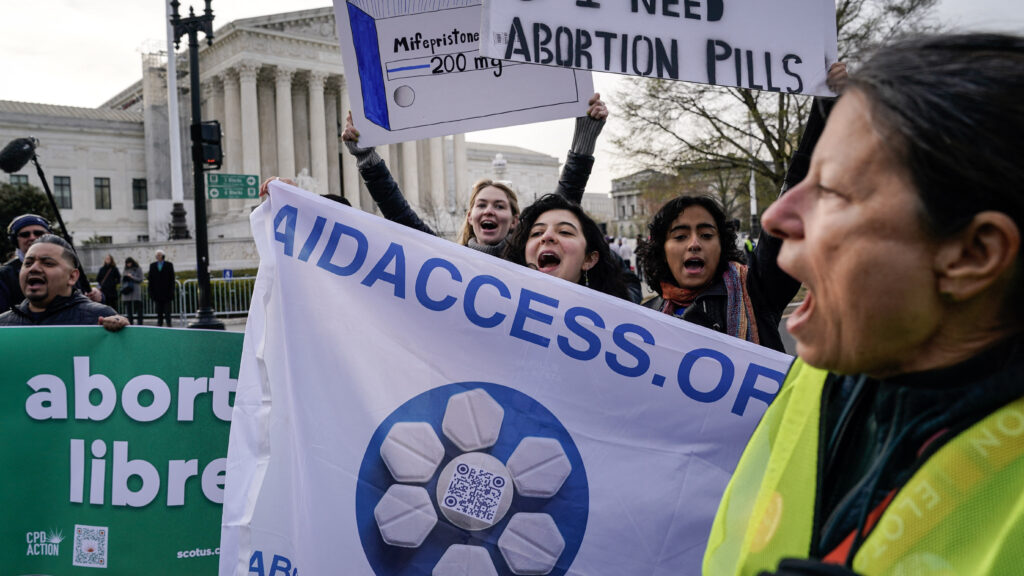The Supreme Court ruled unanimously Thursday that anti-abortion doctors did not have standing to challenge the Food and Drug Administration’s regulation of the abortion pill mifepristone.
The decision in FDA v. Alliance for Hippocratic Medicine reverses an appeals court order to require in-person prescribing of mifepristone, which had been available though telehealth and mail orders since 2021.
advertisement
It’s a victory for the Biden administration’s efforts to protect access to reproductive health care in the wake of the court’s decision to overturn Roe v. Wade. It also affirms the FDA’s authority to regulate medicines, avoiding an outcome that the biopharmaceutical industry had warned could destabilize the drug approval process.
The justices found that the physicians who sued couldn’t be harmed by FDA’s decision to make mifepristone more available, because they aren’t required to provide abortions or other medical care that goes against their conscience.
“Given the broad and comprehensive conscience protections guaranteed by federal law, the plaintiffs have not shown—and cannot show—that FDA’s actions will cause them to suffer any conscience injury,” Justice Brett Kavanaugh wrote in the opinion. “Federal law fully protects doctors against being required to provide abortions or other medical treatment against their consciences—and therefore breaks any chain of causation between FDA’s relaxed regulation of mifepristone and any asserted conscience injuries to the doctors.”
advertisement
Reproductive rights advocates will celebrate the ruling, which helps safeguard access to one of the most common methods of abortion. Mifepristone is used in roughly two-thirds of abortions in the U.S. The figure surged after the court’s 2022 decision overturning Roe v. Wade, triggering new laws and restrictions in 25 states.
Abortion advocates say that mailing the pill has become vital for terminating early pregnancies, particularly in rural areas and medical care deserts.
“It’s incredibly important to have that option via telehealth for folks who can’t reach providers, or when they live in communities … that don’t have providers,” Destiny Lopez, acting co-CEO of the Guttmacher Institute, told senators this month. “Maintaining access to a method that we know is safe and effective, based on decades of widespread use and study, is critically important.”
Drugmakers also breathed a sigh of relief. Industry lobbies and executives argued in letters and amicus briefs that a decision reversing FDA’s labeling decisions could destabilize the industry and shake incentives to develop new therapies.
The decision “maintained the stability of the FDA drug approval process,” Abigail Long, a spokesperson for Danco, maker of the brand name mifepristone pill Mifeprix, said in a statement.
The longtime biotech executive and investor John Maraganore lauded the ruling in an email to STAT: “This is a huge win for the FDA and its authorities, for science and the importance of evidence over religious beliefs, and for women and their rights.”
Kavanaugh’s opinion nodded to another case before the court, over federal requirements that health care providers stabilize patients in emergency situations, including providing an abortion if necessary. The Health and Human Services Department sued Idaho in 2022, arguing the state’s abortion ban violates that requirement, known as EMTALA.
The court has not yet delivered its decision on that case, Idaho v. United States, but noted anti-abortion physicians’ fears that the federal law “might be interpreted to override … federal conscience laws and to require individual emergency room doctors to participate in emergency abortions in some circumstances.”
However, “EMTALA does not require doctors to perform abortions or provide abortion-related medical treatment over their conscience objections because EMTALA does not impose obligations on individual doctors,” the court wrote.
The FDA first approved mifepristone in 2000 for abortion up to seven weeks of pregnancy. The agency in 2016 extended that approval to 10 weeks and in 2021 removed the in-person dispensing requirement, citing two decades of data showing the drug’s relative safety.
During arguments in March, justices questioned whether the doctors represented by the Christian-based organization Alliance for Hippocratic Medicine had been harmed by the FDA’s expansion of mifepristone access.
The plaintiffs put forth in a scenario in which an anti-abortion health care worker would be forced to treat someone with complications from taking mifepristone. Besides violating their beliefs, the practice could expose them to liability, plaintiffs’ lawyers argued.
In a concurring opinion, Justice Clarence Thomas emphasized the lack of standing not just for the doctors but also for the associations opposing abortion, such as the Alliance for Hippocratic Medicine.
“The Alliance’s attempted use of our associational-standing doctrine illustrates how far we have strayed from the traditional rule that plaintiffs must assert only their own injuries,” Thomas wrote.
Mifepristone access could still face other legal threats. Republican attorneys general from three states — Missouri, Kansas, and Idaho — had been eager to join the Alliance for Hippocratic Medicine’s suit and could help bolster plaintiffs’ standing in lower courts.
In Louisiana, the governor recently signed a law to make mifepristone a controlled substance, setting new guardrails around its prescription regardless of its federally approved label.
FDA Commissioner Robert Califf inadvertently — and enthusiastically — interrupted a live-streamed FDA meeting with an apparent celebration of the ruling. “All right! How are you! We got good news,” he exclaimed on a phone call. “Fantastic. Thanks for calling.”
Allison DeAngelis and Meghana Keshavan contributed reporting.

